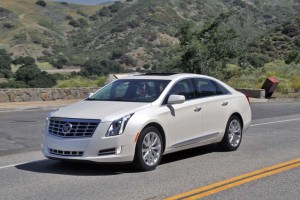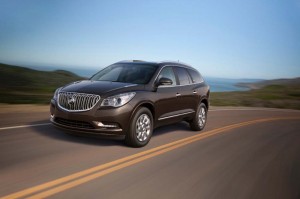Still stinging from the headlines surrounding an ignition switch recall that is blamed for taking at least 12 lives, General Motors today announced another three recalls covering a total of 1.5 million midsize crossover-utility vehicles, commercial vans and luxury sedans.
The maker stressed that there have been no injuries and accidents related to the three separate service actions – recalls that might have largely been relegated to the back page had it not been for the ongoing controversy over GM’s handling of the ignition switch problem last month.
“These are routine recalls,” said GM spokesman Jim Cain, “but these aren’t routine times.”
GM also noted that it will set aside $300 million to cover the cost of the three new recalls as well as the ignition switch recalls announced in February – a figure spokesman Cain acknowledged could increase.
The Detroit maker is facing a series of inquiries by the U.S. Justice Dept., committees on both sides of Congress, the National Highway Traffic Safety Administration – and a team of lawyers GM itself has hired to find out why it waited as much as 13 years to act on the ignition switch problem.
According to the maker, a heavy key ring or jouncing along a rough road can cause the switches in a number of older midsize models to move from the On to ACC or Off positions, possibly causing a vehicle’s engine to stall and its airbag system to fail. At least 12 deaths have been linked to that problem, along with dozens of injuries and 31 crashes.
(Click Here for a primer on the GM ignition switch recall.)
GM initially announced the recall of about 800,000 vehicles on February 13, doubling the total two weeks later. It says approximately 1.4 million of those vehicles are still on the road, including nearly 1.2 million in the U.S. It is planning to race the ignition switches as soon as the necessary parts become available and, for now, will offer loaner vehicles to owners, if requested – and will provide $500 in cash to owners who might want to trade in on new GM products.
What’s apparent is that GM has become gunshy about the possibility of being seen as slow to respond to potential safety problems.
“I asked our team to redouble our efforts on our pending product reviews, bring them forward and resolve them quickly,” Mary Barra, GM CEO, said in announcing the latest recalls. “That is what today’s GM is all about.”
(Hyundai again takes heat for false mileage ratings. Click Here for the latest.)
The largest of today’s new recalls involves 1.18 million midsize crossovers including the 2008 to 2013 Buick Enclave and GMC Acadia lines, 2008 to 2010 Saturn Outlooks and 2009 to 2013 Chevrolet Traverse CUVs.
According to GM, wiring used to control the side-impact airbags mounted in the front seats of those vehicles can become corroded over time and trigger a service warning light. If motorists ignore those warning lights over time it becomes increasingly likely the airbags won’t deploy, as designed, in a side-impact crash.
The maker plans to replace problematic connectors and solder the wires to ensure the airbags don’t fail.
There have been no reported fatalities, injuries or crashes involving any of the latest recalls, though two Cadillac XTS sedans covered by a second service action did catch fire on dealer lots. The recall covers 63,900 of the luxury sedans sold during the 2013 and 2014 model-years, and involves a power brake booster pump. GM says plugs around an electrical relay can loosen, allowing road salt or other corrosive materials to get inside and cause overheating, melting or a fire.
The third recall involves 303,000 Chevrolet Express and GMC Savana vans sold during the 2009 to 2014 model-years. This is a so-called “non-compliance” recall and involves the plastic covers on the passenger-side front airbags. The covers don’t meet federal standards for absorbing a head impact should a passenger not be buckled up and an impact occur that might not be strong enough to trigger the airbag.
GM plans to replace the covers but, in the meantime, is asking motorists to make sure passengers buckle up. It has put a stop-sale on those vans now on dealer lots until it can replace the plastic covers.
Such stop-sales were all but unheard of in years past but are becoming slightly more common as automakers become increasingly pro-active about safety issues under the glare of the media spotlight. In January, Toyota temporarily halted sales of a wide range of products when it learned some fabric in vehicles with heated front seats might not meet NHTSA standards. But Toyota has been pressing the safety agency not to force a recall of those vehicles already out in the field.
(Fire risk forces Honda to recall nearly 900,000 Odyssey minivans. Click Here for details.)



This cost savings backfired… but it will just be a line item in the 10Q so no one is worried as no one will actually be held accountable. If CEOs went to jail or prison for allowing defects to go uncorrected, things might change – quickly.